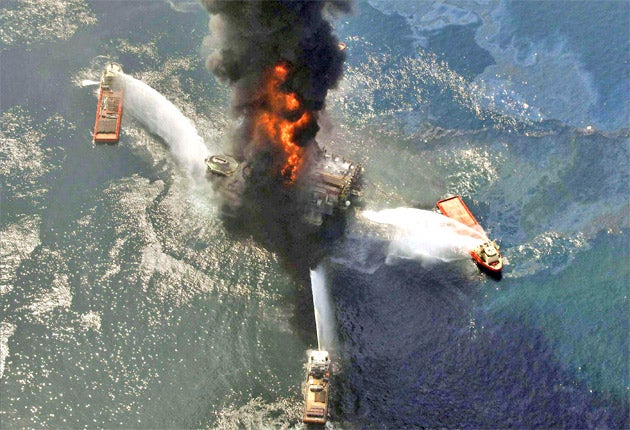Oil disaster inquiry probes 'systemic' failures

Economies and short cuts by BP and other firms contributed to last year's disastrous Gulf of Mexico oil spill, a damning official inquiry has found.
A US presidential commission blamed "systemic" industry failures for last April's rig explosion which killed 11 people and caused one of the worst oil spills in history - also warning they were likely to recur without major reform.
BP, Halliburton and Transocean, the three key companies involved with the Macondo well, made individual decisions that increased risks of a blow-out, but saved significant time or money, the report said.
"Most of the mistakes and oversights at Macondo can be traced back to a single overarching failure - a failure of management," it concluded.
"Better management by BP, Halliburton and Transocean would almost have certainly prevented the blow-out."
The April 20 blast as the Deepwater Horizon rig drilled in deepwater leaked millions of gallons of oil from the well into the sea before finally being capped in July.
It has cost BP billions of dollars in clean-up costs and compensation, and also led to the departure of the energy giant's British chief executive Tony Hayward.
The commission said: "Whether purposeful or not, many of the decisions that BP, Halliburton, and Transocean made that increased the risk of the Macondo blow-out clearly saved those companies significant time (and money).
"BP did not have adequate controls in place to ensure that key decisions in the months leading up to the blow-out were safe or sound from an engineering perspective."
It added: "The blow-out was not the product of a series of abberational decisions made by a rogue industry or government officials that could not have been anticipated or expected to occur again.
"Rather, the root causes are systemic, and absent significant reform in both industry practices and government policies, might well recur."
President Barack Obama set up the National Commission on the BP Deepwater Horizon Oil Spill and Offshore Drilling in May to investigate the spill, and recommend changes to industry and government policy.
The members questioned hundreds of people, reviewed thousands of pages of documents and conducted several public hearings.
Their report found that mistakes and "failures to appreciate risk" compromised safeguards "until the blow-out was inevitable and, at the very end, uncontrollable".
BP's "fundamental mistake" was failing to exercise proper caution over the job of sealing the well with cement, the commission said.
"Based on evidence currently available, there is nothing to suggest that BP's engineering team conducted a formal, disciplined analysis of the combined impact of these risk factors on the prospects for a successful cement job," the report added.
In its central conclusion, the report included a quote from an e-mail written by BP engineer Brett Cocales on April 16, just days before the disaster.
"But, who cares, it's done, end of story, will probably be fine and we'll get a good cement job," Cocales wrote, after he disagreed with BP's decision to use fewer centralisers than recommended. Centralisers are used to centre the pipe to ensure a good cement job. The cement failed at the bottom of the Macondo well, allowing oil and gas to enter it, according to investigations.
BP said the report, like its own investigation, found the accident was the result of multiple causes and involved multiple companies.
The firm added that it was working with regulators "to ensure the lessons learned from Macondo lead to improvements in operations and contractor services in deepwater drilling".
Transocean, which owned the rig being leased by BP to perform the drilling, said in response to the commission's findings that the "the procedures being conducted in the final hours were crafted and directed by BP engineers and approved in advance by federal regulators".
Halliburton, the cement contractor on the well, also said it acted at the direction of BP and was "fully indemnified by BP".
Mr Yeo said the Gulf oil spill had given the industry "a bit of a jolt", although he conceded the possibility of an accident here could never be completely ruled out.
He told BBC Radio 4's Today programme: "I think we are better prepared to minimise the likelihood of one occurring. If one does occur, there is clear evidence that since the Gulf of Mexico incident last year, extra measures have been taken by the industry in the UK to bring more capping and containment equipment to the UK.
"But I think the industry has had a bit of a jolt and I think the whole culture has also now been strengthened.
"You can't eliminate the possibilities of an incident happening here entirely, but you can minimise them."
Subscribe to Independent Premium to bookmark this article
Want to bookmark your favourite articles and stories to read or reference later? Start your Independent Premium subscription today.

Join our commenting forum
Join thought-provoking conversations, follow other Independent readers and see their replies